A church leader in India explains how networks of small Christian communities apply the gospel in their local contexts. “Discipleship needs to be a very collaborative work”.
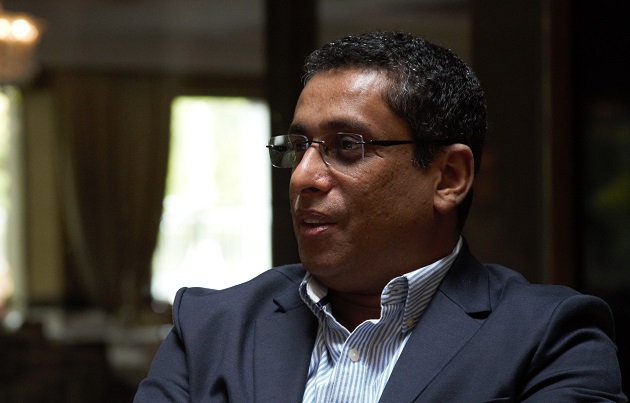 A moment of the interview with Philip*. / Photos: Daniel Hofkamp
A moment of the interview with Philip*. / Photos: Daniel Hofkamp
Churches are multiplying across India, a very diverse country in which many are discovering Jesus through little Christian communities.
Philip* is a leader who has networked with other Christians to equip these new churches with everything that is needed: from good biblical teaching to open wells.
In their aim to help believers apply the gospel to their own context, theologians from India and surrounding countries have come together to carry out the South Asia Bible Commentary.
During his participation in the 2017 European Leadership Forum, Philip shared with Evangelical Focus about the steps Christians are doing in the country to share the Good News about Jesus to the more than forty unreached people groups spread across more than 3,000 kilometres.
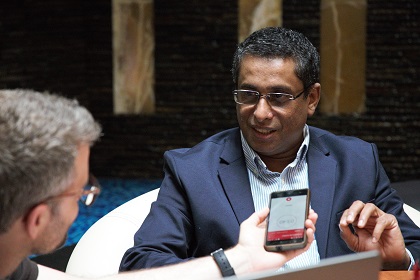
Question. You are helping to lead a big network of churches in India – most of them, Pentecostal. How are these communities?
Answer. Yes, I am part of the leadership that caters for the newly growing churches. These are churches with first-generation believers that have come from mostly tribal and animistic backgrounds. They are part of the Indian larger society but always been considered as on the lower side of the community.
Their identity, as well as their status in the society, is so low, that they have to either depend on the upper castes of society for everything. They have been excluded from the society for ‘purity’ reasons. These tribal are traditionally known as the “Adivasis,” which in Hindi means ‘original inhabitants of the land. If you ask them what an Adivasis means, they would say, ‘we are the first inhabitants of India, but others came and pushed us to the corners and jungles of India.’
Q. It is known that many of these Christians in India are marginalised in their rural communities.
A. Yes, they are doubly marginalised. First, because of their Adivasis background. Second, they have come to Christian faith. The larger community would tell them: ‘Why did you become Christian? You are betraying our society and following a foreign religion. You are not part of us anymore.’ These social exclusions are painful to most of our believers.
For example, in the North West of India, water is very precious. Rain happens only once in a year, during the Monsoon, for one and a half months or two. Naturally, in every village, you would have an open well or a source of water from which everyone gets their water. But when you acknowledge the Lordship of Jesus in your life, the village community would say: ‘You cannot take it anymore because you will impure our water.' So, these Christians have to travel maybe two or three kilometres to just a get bucket of water for themselves. So, this is the kind of situations our believers are facing.
In such case, we would go and stand with these believers by helping them to have a tube well of their own with a condition - that it will be open to everybody who comes to water. God enabled us to drill hundreds of wells. Due to these initiatives, we have seen people having very positive responses to the gospel. The neighbours are asking, ‘why do Christians do this? What makes them different? When we hate you, you respond by wanting to share things with us’.
As a result, we have seen many families come to a church, and to understand how this Grace of God is different.
Q. In that context, how would you describe your vision for India?
A. Our vision is to be a kingdom-oriented community that displays the love and care of Jesus.
Living in a society which is structured by caste hierarchies, though such discrimination is illegal, people live with a mindset which automatically classifies people into different groups. Since your name is attached to a caste group, nobody can turn away from their identity and their past. Only a religious worldview transformation can bring people out of it. As they become part of the kingdom oriented community with equality and self-value, those whose controls the status quo of caste hierarchy are agitated and oppose any such transformation because they assume that they lose their control on these lives. In most places where our congregations gather, we have former diverse caste groups that now come together and worship Jesus. That is a fantastic development that happens within our society.
We are working among 42 unreached people groups. Imagine, their languages are different, their ethnic background is different, and culturally they are very different. Most of our churches have their styles of worship. They use the heart language to praise God; they write songs, and their preaching is all very much narrative and stories rather than heavy theology.
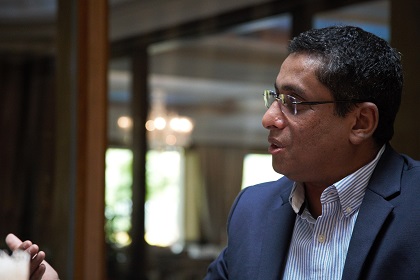
Q. How were these diverse churches started?
A. People in the rural communities do not have access to quality health facilities nor educational services. Further, many do not have economic status to afford treatments. Although services are available, usually, if someone is sick, the first thing they will do is to go to the village priest. He would say: ‘Let’s do a sacrifice for this disease’. Depending on the seriousness of the sickness people have to bring chicken, or goat or other elements for sacrifice. Apart from this, they have to give money.
In most case, a pastor or an elder would visit a location where someone is sick, and they would pray for them. They pray and Jesus answers their prayer, heals that sickness. In many situations, sometimes it is immediate, sometimes it takes a month. And people develop that close connection with Jesus.
Let me share the story of Vijay and his wife, Roopa. Roopa had a problem in her legs, and the doctor said the leg had to be amputated. Somebody said: ‘Vijay, let’s bring your wife to the church, and when the pastor comes, he could pray for her.' The pastor came from a 3-hour distance, and he prayed for her. It took about a month, and she was completely healed. So Vijay asked: ‘How much money do I owe you?’, and the pastor responded: ‘You do not owe me any money, but if you can open your home for prayer and devotion for Jesus, that would be the best thing.'
When this Christian pastor started coming to the village, many in the village heard that he could pray, and Jesus can heal. One day, the pastor was expected to come, and one prominent person in the community came with a sickness. But the pastor didn’t arrive, and Vijay felt he was in trouble. He was praying to know what to do, and he got the confidence, and said: ‘I will pray for you.' Slowly, this man began to experience the healing power of Jesus and became a believer. Now, Vijay is leading a church of 60 people. Jesus as the Healer is the good news that brings people to the Lord. This is the way the Good News is passed from one person to another.
It typically takes five to six years for a person from an animistic worldview to come to a Christian worldview. In that process, we offer lots of studies on topics like a basic Christology: ‘Who is Jesus?’ Most of the believers would start with four Christological statements: ‘Jesus as the healer,' ‘Jesus as the provider,' ‘Jesus as protector’ and ‘Jesus as the deliverer.' But then, they move to the next three stages: ‘Jesus as saviour,' ‘Jesus as Lord’, and ‘Jesus as the supreme God.' This is the process that moves from an animistic worldview to a Christian world, and this has all to do with our identity.
But the next level is crucial. After six or eight months regularly worshipping, people slowly realize the importance of being baptised, because that forms the identity and community, and it is cutting off of the older background. They wilfully take this major decision of being baptised.
Jesus as the healer is Good News. Simple believers share these Good News. This is how church planting generally happens.
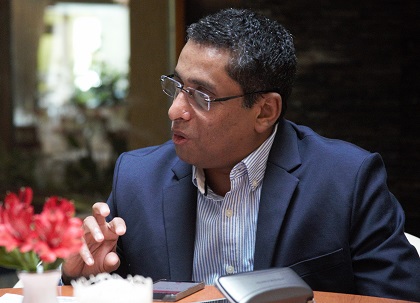
Q. How do these new Christians of different ages and backgrounds start to read, study and understand the Bible?
A. It is always a challenge, because or work is spread across about 3,000 kilometres. Many times the growth happens in churches that multiply themselves.
A person that can sing and pray well starts the next congregation, but may not be good in the Word of God. So, what we normally do is to call leaders who are involved in a church planting to get involved in a group. Then, we will send a teacher to teach the Word systematically. In a year, three to four times regional leaders are brought together, and we teach them on biblical subjects, fundamental theology, pastoral care, and mission. In a group, 70 to 100 people would gather, and then we send them back to their communities to apply what they learned.
In some regions people are illiterate, they cannot read or write. In such contexts, we engage songs and music as a means to teach the Word. We have leaders who write songs with a beautiful theology embedded in them so that it will help them to remember.
Now, there is a lot of mobile technology available even in the most rural regions of India. We record preachings that we do in our lead churches put in SD cards and make it accessible to use in mobiles phones.
These are simple ways of training people in the Bible, but there is a lot to do to accomplish this task.
Q. One interesting project to teach the Bible in a context like India is the “South Asia Bible Commentary”. You have been involved in that. Why do you think a tool like this is needed?
A. The SABC, which is how we call it, is an initiative that God enabled us to do with Langham Partnership. The director of literature there, Pieter Kwant, when he came to India, told us: ‘The Africans are writing a Bible commentary’. Then, the Indians experienced some holy jealousy and said: ‘If they are doing it, we should do it!’
It was such a simple beginning, but it was a ‘kairos’ moment for the South Asian churches. God has given us good evangelical scholars, but never an effort to bring them together had been made to ask them to write and think the Bible in their context. This was a big challenge.
I am part of the theology editorial board and the publisher of the commentary. 70 people were identified and given books of the Bible. Psalms, for instance, was given to different people to write.
In this process, many things have happened. One is that we could gather together with all these scholars and think through the Bible in our situation and our context. Secondly, for the first time Pakistani Christians, Indian Christians, Sri Lankans Christians, and Nepali Christians were writing for one project. So, we were brought together nationally.
The third thing was that we agreed that we would avoid scholarly technical theological jargon. We said we would think about the simple believer, and make our language straight forward to them. It was hard for us, at times, we would have a project editor who would trash our theological jargon [laughs] and make it into a newspaper language.
The commentary is from Genesis to Revelation, but within the commentary, we have one hundred articles which are very relevant to the South Asian context. For example: ‘How should Christians view yoga?’, ‘How do Christians deal with corruption?’ or ‘What is sexuality in our context?’ Giving and evangelical answer to these challenges helps the pastor who faces these challenges.
Once we completed the project, the best reactions we got were in the lines of ‘now I can understand and read the Bible clearly’. So that is what God has enabled this commentary to bring.
We produced the commentary in English. But that is not our major achievement. Our achievement is now translating it into Hindi, Tamil, Bangla, and other multiple languages in South Asia. Three translations have already been initiated.
In two or three years time this will become a major evangelical tool which will shape the preaching and teaching of the church. This was the missing point in the Indian church. We always had to depend on our Western friends to help us think our theology. But now the time has come, we are now starting writing about what we need for our people.
Out of this project, others are coming out. There is an Indian New Testament Commentary series that has started. This means it gave confidence to the people to initiate new reflections on the Bible.
A by-product of these seven years of production is that we have learned how to do things professionally.
We have come to where we are now, God willing we will be taking it further.
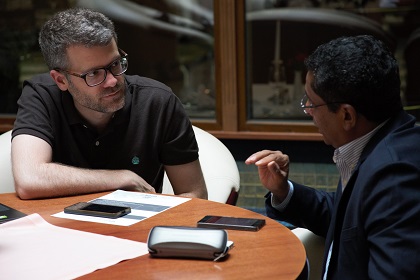
Q. Technology and online communications advance much in India. What do you think is the one primary challenge for the church there in this new hyper-connected context?
A. India has become one of the largest users of mobile phones in the world, and smartphones have reached every corner of the country.
Now every person of an unreached group has a cell phone available. What the church has not yet accomplished is to create the content that is needed for evangelising them nor the discipleship materials that would help the churches to grow. That needs to be a very collaborative work, we need to work as a church.
And perhaps the global church can stand with us, motivate us so that we can produce our content.
We are not yet equipped to face the challenge, and I believe we will be out of the scene if we do not do anything to get the technology to produce these new resources for the churches.

Las opiniones vertidas por nuestros colaboradores se realizan a nivel personal, pudiendo coincidir o no con la postura de la dirección de Protestante Digital.
Si quieres comentar o